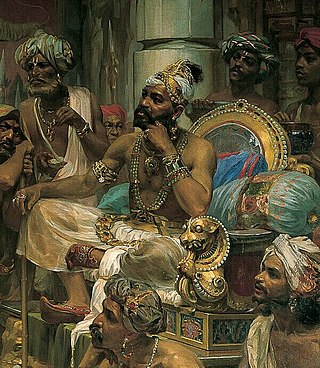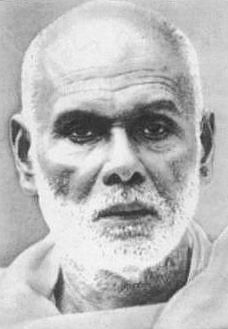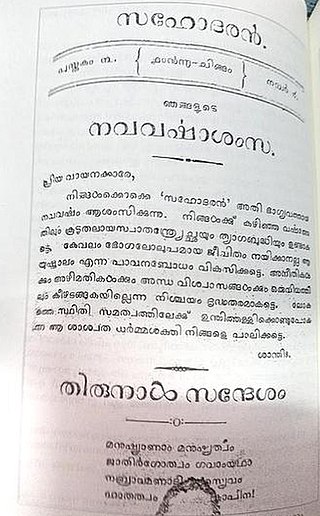Related Research Articles

Kozhikode, also known as Calicut, is a city along the Malabar Coast in the state of Kerala in India. Known as the City of Spices, Kozhikode is listed among the UNESCO's Cities of Literature.

Malabar Muslims or Muslim Mappilas are members of the Muslim community found predominantly in Kerala and the Lakshadweep islands in Southern India. The term Mappila (Ma-Pilla) is used to describe Malabar Muslims in Northern Kerala. Muslims share the common language of Malayalam with the other religious communities of Kerala.
Malayalam journalism encompasses journalism published and broadcast in the Malayalam language. Modern Malayalam journalism can be traced to the publication of the Raajyasamaachaaram and the Pashchimodhayam under the direction of Hermann Gundert in June 1847. Kerala has the highest media exposure in India with newspapers publishing in nine languages, mainly English and Malayalam.

Kizhakke Potta Kesava Menon was an Indian nationalist, idealist and Indian independence activist. Menon was the founder of Mathrubhumi, a popular daily newspaper which earned the second place in circulation in Kerala. In 1924, he led the Vaikom Satyagraha in Travancore. He was awarded the third highest civilian honour, Padma Bhushan, by the Government of India in 1966. He was conferred with an honorary doctorate (D.Litt) posthumously by University of Calicut in 1987.

Malabar District, also known as British Malabar or simply Malabar was an administrative district on the southwestern Malabar Coast of Bombay Presidency (1792–1800), Madras Presidency (1800–1950) and finally, Madras State (1950–1956) in India. It was the most populous and the third-largest district in the erstwhile Madras State. The historic town of Kozhikode was the administrative headquarters of this district.

Kozhikode, is one of the 14 districts in the Indian state of Kerala, along its southwestern Malabar Coast. The city of Kozhikode, also known as Calicut, is the district headquarters. The district is 67.15% urbanised.
Vengayil Kunhiraman Nayanar was a Malayali essayist and short story writer, and a prominent landlord of Malabar district.

Tanur is a coastal town, a municipality, and a block located in Tirur Taluk, Malappuram district, Kerala, India. It is located on the Malabar Coast, 9 kilometres (5.6 mi) north of Tirur and 9 kilometres south of Parappanangadi. It is the 17th-most populated municipality in the state, the fourth-most populated municipality in the district, and the second-most densely populated municipality in Malappuram district, having about 3,568 residents per square kilometre as of the year 2011.

The Samoothiri was the title of the erstwhile ruler and monarch of the Calicut kingdom in the South Malabar region of India. Originating from the former feudal kingdom of Nediyiruppu Swaroopam, the Samoothiris and their vassal kings from Nilambur Kovilakam established Calicut as one of the most important trading ports on the southwest coast of India. At the peak of their reign, they ruled over a region extending from Kozhikode Kollam to the forested borders of Panthalayini Kollam (Koyilandy). The Samoothiris belonged to the Eradi subcaste of the Samantan community of colonial Kerala, and were originally the ruling chiefs of Eranad. The final Zamorin of Calicut committed suicide by setting fire to his palace and burning himself alive inside it, upon learning that Hyder Ali had captured the neighboring country of Chirakkal in Kannur.

Moorkoth Kumaran (1874–1941) was a social reformer, a teacher and a writer in Malayalam. He came from a Thiyya family of Telicherry. He was a disciple of Narayana Guru and wrote the first biography of Guru. He also published some of the earliest short stories and novels in Malayalam.
Changaramkumarath Krishnan Vakkeel was a community leader, banker, social reformer, and journalist from Kerala, India. He was a champion of implementing the revolutionary socialist reforms proposed by Sree Narayana Guru for the upliftment of the downtrodden people of Kerala. He was called Mithavathi―a minimalist―after the newspaper he published from 1913 to 1938 to spread the message of the reformist movement. He was well-educated and hailed from an influential family. Although he could have entered the government service and risen to higher positions with his education and wealth, he renounced all these for the liberation of the backward classes from the clutch of pathological social system.

Prabodhanam is a weekly Islamic magazine published in Malayalam from Kozhikode(Calicut) in Kerala, India.

The Kingdom of Kozhikode, also known as Calicut, was the kingdom of the Zamorin of Calicut, in the present-day Indian state of Kerala. Present-day Kozhikode is the second largest city in Kerala, as well as the headquarters of Kozhikode district.
Malappuram is one of the 14 districts in the South Indian state of Kerala. The district has a unique and eventful history starting from pre-historic times. During the early medieval period, the district was the home to two of the four major kingdoms that ruled Kerala. Perumpadappu was the original hometown of the Kingdom of Cochin, which is also known as Perumbadappu Swaroopam, and Nediyiruppu was the original hometown of the Zamorin of Calicut, which is also known as Nediyiruppu Swaroopam. Besides, the original headquarters of the Palakkad Rajas were also at Athavanad in the district.

Dr. Ayyathan Janaki Ammal (1878–1945) was the first women (female) doctor and surgeon of Kerala She acclaim the name and title as the first Malayali lady doctor and surgeon of Kerala. She is the sister to Ayyathan Gopalan. a social reformer of Kerala, the founder of the Sugunavardhini movement (1900), Depressed Classes Mission (1909) and the leader and propagandist of Brahmo Samaj in Kerala.

South Malabar refers to a geographical area of the southwestern coast of India covering some parts of the present-day Kerala state. South Malabar covers the regions included in present-day Kozhikode and Thamarassery taluk of Kozhikode district, Wayanad district excluding Mananthavady taluk, the whole area of Malappuram district, Chavakkad taluk of Thrissur district, and Palakkad district, excluding parts of Chittur taluk. The Fort Kochi region of Kochi city also historically belongs to South Malabar. The term South Malabar refers to the region of the erstwhile Malabar District south to the river Korapuzha, and bears a high cultural similarity to both the Cochin and the North Malabar regions.

The Kallingal Madathil Rarichan Moopan (1856–1919) was a Jenmi in Kozhikode. He was a social reformer of Malabar. He is known for community development and other social services.
Prabhatham was a Malayalam-language weekly newspaper published from Shoranur in Malabar, British India. Founded in 1935 and edited by E. M. S. Namboodiripad, it was the organ of the Congress Socialist Party (CSP) in Malabar, Travancore and Cochin. The newspaper was subjected to censorship right from its inception. It had to close down due to the heavy security imposed on the paper for publishing a poem on Bhagat Singh's death. The newspaper resumed publication in April 1938. It shifted to Calicut and continued as a weekly until the outbreak of World War II in September 1939. Prabhatham was a short-lived newspaper both because of the colonial repression and because the CSP had lost its relevance after the formation of the Communist Party of India. The newspaper was instrumental in spreading socialist and communist ideologies in Kerala.
Kerala Sanchari was a Malayalam-language newspaper published from Calicut in Malabar, British India. It was established by Poovadan Raman Vakil in 1886 and was printed at his Spectator Press. Vengayil Kunhiraman Nayanar was the editor for the first six months. The newspaper changed ownership soon and C. Krishnan took over as the editor under the new management. In February 1897, Moorkoth Kumaran became the editor. C. P. Govindan Nair also served as the editor for many years. Kerala Sanchari finally merged with Mithavadi which was started by Moorkoth Kumaran in 1907.

Sahodaran was an Indian Malayalam-language newspaper published in Kerala from 1917 to 1956. It was the mouthpiece of Sahodara Sangham, an organisation founded by Sahodaran Ayyappan to fight against the caste system in Kerala.
References
- 1 2 A. Shaji. "Situating the role of print media in hastening communalism in modern Travancore" (PDF). Proceedings of the Indian History Congress. 77: 706–717.
- ↑ "History of Press in Kerala". Public Relations Department, Government of Kerala. Archived from the original on 7 August 2014. Retrieved 12 February 2023.
- ↑ Stella Joseph. "Tenancy - A much debated issue" (PDF). Print and public sphere in Malabar: a study of early newspapers (1847-1930) (Thesis). University of Calicut.